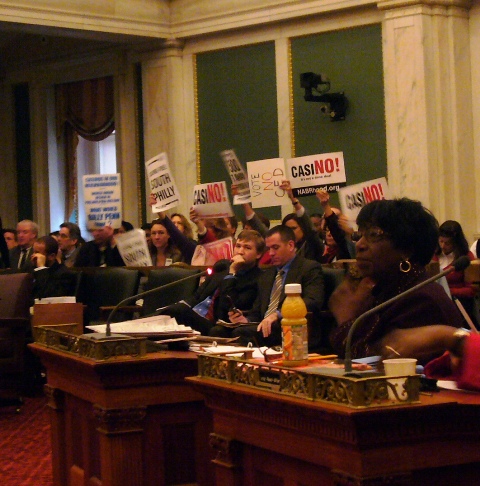Foxwoods zoning legislation introduced

Jan. 24
Ordinance for Foxwoods CED designation
Ordinance for Foxwoods plan of development
By Kellie Patrick Gates
For PlanPhilly
Legislation that would allow Foxwoods Casino to operate on its proposed riverfront site was today introduced in City Council on behalf of the councilman who spent the past year trying to move the casinos elsewhere.
Majority Leader Marian Tasco introduced the bill for Councilman Frank DiCicco, who was on a vacation his spokesman said had been planned before the City Council calendar was released.
As the bill title and summary was read and the motion that sends it off to committee was unanimously passed, about 10 people who oppose Foxwoods or its current location stood holding signs” “1,500 Feet Away From All,” read one. “Casino-Free South Philly,” said another. A few of them also hissed. All of them wondered why the councilman who had worked closely with them, who had championed their cause, would take this step without at least talking to them first.
“We feel betrayed,” anti-casino advocate Mary Reinhardt said in the hallway afterward. “I am very, very distressed and disappointed,” said Rosanne Loesch, a member of the Society Hill Civic Association and a delegate of Philadelphia Neighborhood Alliance – the union of the many neighborhood associations that want the casinos located further away from any residential neighborhood. “He did not consult with the community at all. We were blindsided,” she said. “I didn’t even know this was happening until after 9 p.m. last night.”
Foxwoods spokeswoman Maureen Garrity said the casino’s officials and attorneys are still reviewing the proposed ordinances, but they see their introduction as a positive sign. “By introducing these ordinances, City Council is recognizing that Foxwoods is entitled to proceed with developing a casino at its site in South Philadelphia,” she said.
DiCicco spokesman Brian Abernathy said the councilman has not betrayed his constituency. He handed out a written statement, in which his boss says the State Supreme Court’s Dec. 3 decision to grant Commercial Entertainment District zoning to SugarHouse – the city’s other proposed casino – forced his hand.
The Supreme Court agreed with SugarHouse that City Council had intentionally and inappropriately delayed acting on the SugarHouse project in attempt to block it.
“Although I disagree, I have heard and have heeded the Supreme Court’s opinion of council’s failure to act on gaming matters. The introduction of this legislation is not a shift in my position,” DiCicco says in the statement. “I still have serious and reasonable concerns about this project that must be addressed. This bill helps guarantee that they are.”
Abernathy said the State Supreme Court’s SugarHouse zoning decision took power out of the city’s hands, and introducing this legislation should prevent a repeat court performance.
Even if DiCicco felt he had to act, Loesch wants to know why he didn’t propose putting the Commercial Entertainment District in another area.
When asked if granting the casino the zoning it seeks, on the site it wants, would end all talk of relocating the casino, Abernathy said it would not.
The proposed city legislation contains conditions that must be met in order for the zoning for the site to go into effect and “we set the bar really high,” Abernathy said. “I don’t think Foxwoods will like this legislation.”
Mary Isaacson, spokeswoman for Rep. Mike O’Brien, who has also worked to move the casinos – agreed with Abernathy. She considered DiCicco’s proposal a sort of Plan B to pending legislation and other efforts to relocate the casinos. “I think when (Foxwoods officials) see what is the starting point of what is required to even consider that site, they may think twice and move to another site that’s more viable,” she said.
The conditions include a community benefits agreement, improvements to public safety and traffic congestion, an economic impact study for the surrounding area, a satisfactory agreement between the developer and the City and Council’s approval of the city plan revisions necessary for the project. Those include rights-of-way for sewer/water purposes and a street that runs through the property. Foxwoods needs those city plan revisions to begin construction.
That last condition is a requirement for Foxwoods to obtain riparian rights – the right to build on state riverbed land – through the General Assembly, Abernathy said.
Foxwoods is concerned by some of the requirements in DiCicco’s bill.
” The proposed ordinances contain highly unusual conditions that have not been attached to other zoning legislation, including those transmitted for the casino sites last year,” Garrity said. “Foxwoods has addressed many of the issues raised by the proposed ordinances through the Development Agreement it entered into with the City and through review with appropriate City and local agencies.”
But the situation is far from simple:
* Foxwoods’ needed riparian rights to build its project as originally planned, but last year, the casino changed its plans, and casino officials say they no longer need those rights.
Said DiCicco in his statement: “When PEDP (aka, Philadelphia Entertainment and Development Partners, Foxwoods) was awarded a gaming license on December 20, 2006, their plan of development included control of riparian land. Today’s proposal, however is an inferior project designed to avoid dealing with the General Assembly. I don’t think that’s appropriate.”
But could the city force Foxwoods to go back to the original plan? Abernathy said they would try.
* It is at this moment legally hazy whether the state legislature is the only route for a project like Foxwoods to get its riparian rights. While that has historically been the case, that’s not how SugarHouse did it. Attorneys for that casino found a law from the early 1900s which they say gave the City Commerce Department that power. The pro-casino Street Administration agreed. The Commerce Department had a hearing, and gave SugarHouse riparian rights. But today, Mayor Nutter – who has initiated a review of all casino decisions made in the previous administration – revoked that license.
* Other attorneys – including Christopher Craig, the chief counsel for Sen. Vincent Fumo – say that old law no longer applies, because a newer state law specifically says riparian rights can only be granted by the legislature. Fumo, State Rep. Mike O’Brien, and other state legislators from Philadelphia whose districts touch the Delaware River, have filed a lawsuit in State Supreme Court, hoping to overturn the Commerce Department’s Decision. Meanwhile, there’s a new city administration that’s reviewing all past decisions related to casinos, including the one that allowed the Commerce Department to grant riparian rights.
Loesch and Reinhardt said while the conditions make DiCicco’s proposal somewhat more palatable, they think he took a risky step. “There is a fear the conditions could be severed by the Supreme Court,” Loesch said.
The current language of the proposal was finalized only Wednesday night, Abernathy said. Community leaders were not consulted because “We didn’t think we could get consensus.” Abernathy said based on the feedback he’d been getting Thursday, that was the right call.
But there is still time to amend the proposal, and time for constituents to have a voice in what it says, he said.
The legislation must pass committee by a majority. There will also be at least one public hearing, and likely more, so the public will have a say, Abernathy said. The legislation will then be read twice more in City Council. The second reading is when the vote that makes it real or kills it would happen.
“This isn’t the end,” Abernathy said.
With that, Loesch agreed. “We have fought too hard,” she said. “We will continue to fight.”
And while disappointed in their city councilman, those who want the casinos elsewhere say they will continue to work with him.
When asked if she supported the legislation she introduced today, Tasco said she hadn’t even read it. She brought it forward as part of her Majority Leader role because DiCicco was not in town.
WHYY is your source for fact-based, in-depth journalism and information. As a nonprofit organization, we rely on financial support from readers like you. Please give today.






